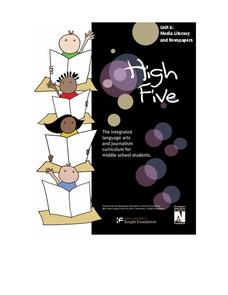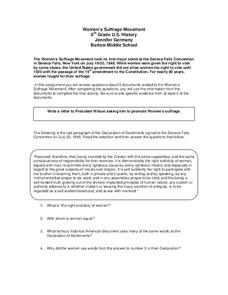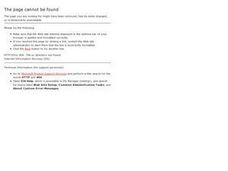National Endowment for the Humanities
The Declaration of Independence in Six Parts
Everyone knows that the Declaration of Independence is important, but what does it actually say? Members of American history classes analyze the Founding Fathers' arguments against British tyranny and for a more perfect union with a...
Curated OER
For the Record
Students read a New York Times article in order to examine the importance of cultural artifacts. They create essays from the point of view of one cultural artifact to demonstrate the knowledge they gained by doing research.
Dream of a Nation
Writing an Analytic Essay
After researching an issue introduced in Tyson Miller's Dream of a Nation: Inspiring Ideas for a Better America, writers develop an original thesis statement and craft an analytic essay using evidence collected in their research.
American Press Institute
High Five: Media Literacy and Newspapers
Teach the five different types of media with the first of three in a media literacy unit. Learners create and propose a final newspaper project, which must address information covered throughout the unit.
National Endowment for the Humanities
Slavery and the American Founding: The "Inconsistency Not to Be Excused"
High schoolers examine slavery in the revolutionary and colonial eras of the United States. In this slavery lesson, students investigate the presence of slavery in early America, the language of the Constitution, and the intent of the...
K12 Reader
Find the Meaning: JFK's Inaugural Speech
Analyze a seminal speech from the 20th century with an activity focused on President John F. Kennedy's inaugural address. After reading an excerpt from the address, pupils use a worksheet to practice their reading comprehension skills...
US Department of Education
A Close Reading of Lincoln’s Gettysburg Address
Abraham Lincoln's Gettysburg Address provides the text for a series of close reading exercises that model for instructors how carefully crafted guiding questions can help readers think critically about what they read, thus developing...
Curated OER
Women’s Suffrage Movement
Though the movement for Women's Suffrage stretched over several decades and across two centuries, the final few years were the most difficult hurdle in many ways. Use a document-based question writing exercise to make inferences about...
Turabian Teacher Collaborative
My Favorite Martian: Workshopping Warrants
Sometimes explaining an argument can lead to confusion and miscommunication. Narrow down the details in written arguments with a group activity in which learners pretend to be aliens from another planet, struggling to understand each...
Newspaper Association of America
Power Pack: Lessons in Civics, Math, and Fine Arts
Newspaper in Education (NIE) Week honors the contributions of the newspaper and is celebrated in the resource within a civics, mathematics, and fine arts setting. The resource represents every grade from 3rd to 12th with questions and...
iCivics
Drafting Board: Electoral College
Should the president of the United States be voted by the Electoral College or the popular vote? Your young historians will consider the pros and cons of the Electoral College, and make an argument using reasons and evidence provided in...
National Endowment for the Humanities
Revolution '67, Lesson 2: What Happened in July 1967? How Do We Know?
Even in a world in which dozens of participants and curious onlookers record every controversial event, the basic facts of what happened are often in dispute. Revolution '67, Lesson 2 explores 1967 Newark, New Jersey using an examination...
University of Pennsylvania
Using Political Postcards to Teach a Revolution of Political Thought
Discuss how political postcards affected everyday people's thoughts and beliefs. Pupils continue a unit on the Dreyfus Affair as they engage in class discussion, watch a video, view a PowerPoint presentation, and fill out worksheets to...
University of Pennsylvania
Decoding Propaganda: J’Accuse…! vs. J’Accuse…!
Reading snail mail is a great way to go back into history and to understand others' points of view. The resource, the second in a five-part unit, covers the Dreyfus Affair. Scholars, working in two different groups, read one letter and...
Constitutional Rights Foundation
If Men Were Angels: Teaching the Constitution With the Federalist Papers
Much like the methods of group work, the writers of the Federalist Papers worked together to advocate for their viewpoints against the anti-federalists. The resource enables learners to break into small groups and conduct research before...
Curated OER
Supporting Opinions: Handling the End of a Friendship
Four thought-provoking questions encourage readers to develop and support their opinions about strategies to end a friendship after exploring excerpts from a New York Times article. The reading is brief so this could be a lead-in to...
National Endowment for the Humanities
The Monroe Doctrine: A Close Reading
Students identify specific passages in the Monroe Doctrine to events in early U.S. diplomacy.
Maryland Department of Education
The Concept of Identity Lesson 4: The Psychological Approach
Readers apply Sigmund Freud's theories of the unconscious mind and the psychological approach to literary criticism to analyze and evaluate the relationship between two characters in A Separate Peace.
Stockton University Wordpress
Civil Disobedience: Is it ever ok to break the law?
As part of a study of civil disobedience, class members read excerpts from the writings of activists who were willing to break the law to protest unjust laws.
Maryland Department of Education
The Concept of Identity Lesson 5: Motivation - Maslow's Hierarchy of Needs
Maslow's Hierarchy of Needs provides the lens class members use to analyze and evaluate the motivations of the characters in Sylvia Plath's "Initiation" and scenes from Mean Girls. Readers then select a character from A Separate...
Curated OER
William Apess and the Mashpee "Revolt" of 1833
Prompt your class with the following question: What was the status of American Indians in Massachusetts during Jackson's presidency? To answer this question, class members will read a series of primary source documents (attached),...
Student Handouts
End to the Cold War
Introduce your class to topics relating to the Cold War through a brief reading selection. Class members read the passage and answer four questions, which are provided on the bottom of the page.























